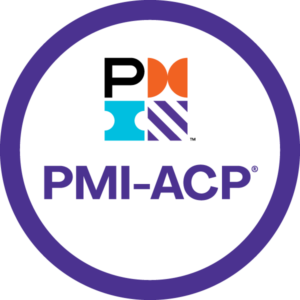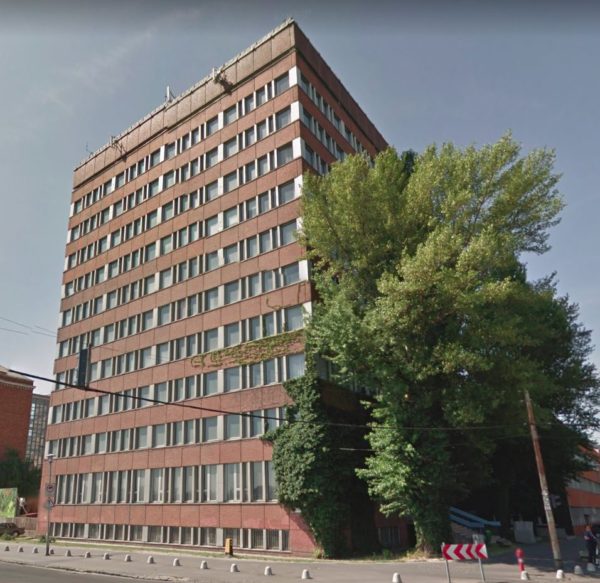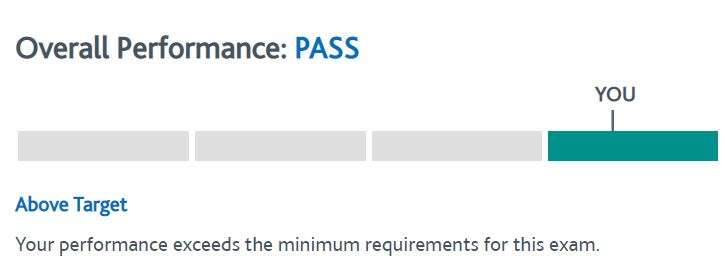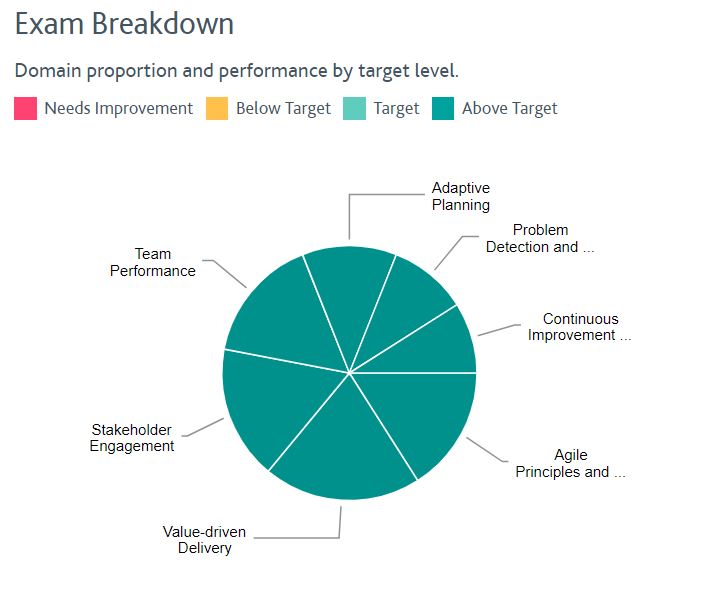How is the exam structured?
The PMI-ACP exam is structured in a similar way to PMI's other notoriously difficult exams. The 3-hour, 120-question exam has 4 answer choices for each question. The questions do not primarily measure lexical knowledge, but ask about real-life situations that arise in practice. As in other PMI exams, there is no pre-defined score, the result of the exam is determined according to a scoring system strictly guarded by PMI, based on the difficulty level of the questions. Experience has shown that depending on the difficulty of the exam, a pass rate of around 65-75% is achieved. The computer-based exam is available several times each week at Prometric's exam centre, currently located in the BME "Z" building in Budapest.

What can you expect on the PMI-ACP exam?
Below we have tried to gather personal experiences of the latest exam, which was changed in March 2018. These are subjective descriptions based on our own experiences, but as the highest above target results were achieved in all areas, we trust that they will be of help to all candidates.
- There were few questions that asked for a specific theory (e.g. Little's Law, or points of the Agile Manifesto)
- In many cases, 1-2 options could be excluded from the answers, but there was minimal variation between the rest. In this case, it may be a good tactic to evaluate the options along the agile principles and make choices based on that.
- Many (10+) questions dealt with some kind of change situation. For example: during an iteration, we are approached by a client to stop the current tasks immediately because a more important need has been identified. What do we do in this situation?
- In several questions, the specific methodology used had to be identified from the description of the task and could be used to answer the question correctly (e.g. scrum master vs. agile coach, or PO vs. customer).
- There were also quite a few questions about team dynamics, team development. We had to identify the best tools to support the team at a given stage and in a given situation.
- There are 3-4 questions about the applicability and purpose of information radiators.
- Several questions addressed WIP and kanban tables, but only one question asked for cycle times.
- Apart from the above, there was barely any calculation involved, such as estimating when the team was expected to finish the work based on a burndown chart.
- There were 4-5 questions about refactoring, with technical debt being at the centre of most of these questions.
- There were a few questions focusing on the differences between traditional and agile approaches.
- 4-5 questions asked about team composition, location and infrastructure.
- Time seems to be a lot and although the questions are a bit shorter than in the PMP exam, it still takes a lot of time to interpret the question and situation, with many of the "least, best, except" terms appearing, which fundamentally change the correct answer.
- A serious psychological pressure remains the constant counter and the sometimes unnecessary information that appears during the questions, which must be filtered out quickly.
- We need to replace the concept of agile project manager, in many cases describing otherwise real-life situations, with the right answer in this role.
- The exam does not focus on a specific methodology, in several cases the way of work or customisation, even the applicability of hybrid solutions, is included, where the solution considered best by the PMI has to be selected based on the partial information provided.
Location, environment
The exam can be taken in BME Building "Z", Bertalan Lajos Street, District XI. The examination system continues to work well, smoothly and without any disruptions. During the summer period, 5 people took the exam in different subjects at the same time, but participants are still called in and checked one by one, so the last candidate's start can be delayed by up to 20 minutes. As the proctors were already in at 8:30am, there was no need to wait for the 9am start. Food, drinks, watches and bags are still not allowed in the room, and everything, apart from ID cards and the paper and pen you have been given, must be put in a lockable cupboard. 3 hours is a long time, although the clock does not stop, a break is recommended. Overall, what is necessary for the exam is provided, but nothing more.

Evaluation
The exam questions are grouped along 7 areas, and feedback is given along these areas at the end of the exam. The officially communicated ratios are as follows, and these are roughly the ratios that appeared in the live exam:
- Agile principles and mindset - 16%
- Value-driven delivery - 20%
- Stakeholder engagement - 17%
- Team performance - 16%
- Adaptive planning - 12%
- Problem detection and solution - 10%
- Continuous improvement - 9%


Prerequisites, when can I take the exam?
You can apply for the PMI-ACP exam if you have the following experience:
- 2000 hours, minimum 12 months of general project experience from the previous 5 years (PMP certification automatically fulfils this requirement),
- in addition to the above project experience an additional 1500 hours, minimum 8 months of project experience using Agile methodologies from the previous 3 years,
- 21 hours of training covering agile methodologies, which our programme verifies as a prerequisite
The purpose of the prerequisite certification is to enable PMI to screen experts who can obtain this qualification. This will minimise the chances of someone with no practical experience and only a lexical knowledge to obtain a diploma. The way to prove the prerequisites is to fill in an electronic project form and attach a training diploma. The validity of the prerequisites is often checked by PMI through audits.
How, what can we use to prepare?
Unfortunately, there is currently no book that covers the full syllabus of the exam. It was a lot of work to learn the syllabus, which often required "reading" several books together. There are few good-quality exam questions available, so there were a few surprises in the exam about the type of questions.
Unlike the PMP and PMBOK Guide, the Agile Practice Guide published by PMI does not cover the exam in full, the list of recommended publications by PMI are available here. For independent preparation, Mike Griffiths' PMI-ACP Exam Prep book is recommended.
In order to make your preparation more efficient and successful, we have launched a PMI-ACP exam preparation course, which includes many practice exercises, sample tests and personal consultations. Through this programme, we are able to deliver the material covered in the exam and illustrate it through practical examples. This can greatly reduce preparation time and can also replace the teaching prerequisite.

 Designabc
Designabc